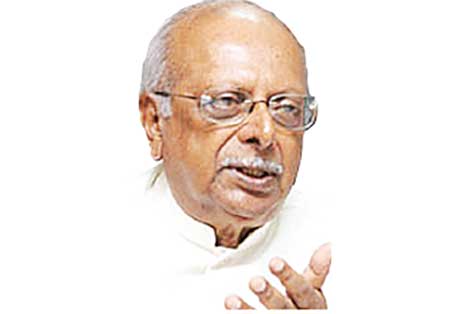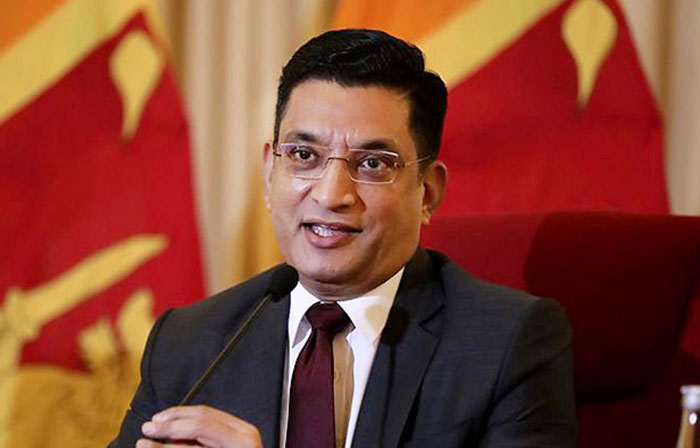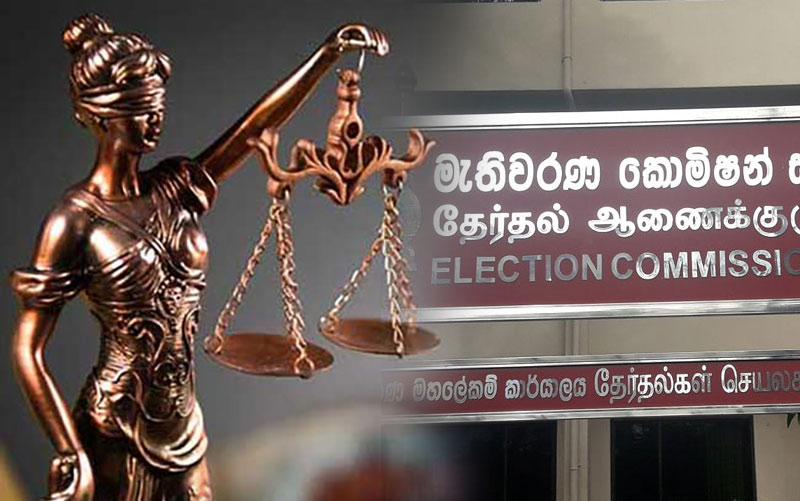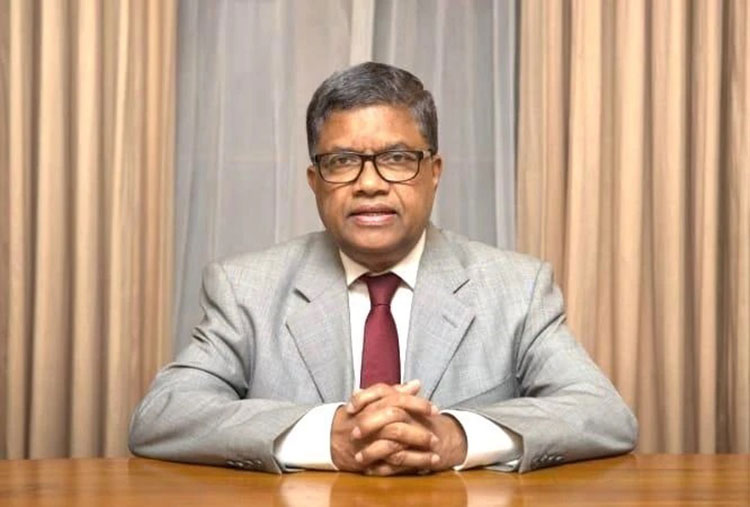News
Covid-19 pandemic spreads due to lack of a people-based campaign

The Covid-19 pandemic continues to spread at an alarming rate in Sri Lanka and in most countries world-wide. This is mainly due to the lack of a people-based campaign with proper leadership. In Sri Lanka the corona virus was introduced into the country by identified individuals coming from abroad. By identifying each case and the contacts who formed a cluster and isolating each cluster for the required period, the spread to the community was prevented.
This was done effectively by Sri Lanka’s good Public Health Service well supported by the Armed Forces. But with a high percentage of those infected not showing any symptoms (maybe as much as 80%), the virus began to spread among the community.
But that stage is well passed and today there is extensive spread among the community island- wide. Community spread began in the Western province with Colombo as the focus. Had there been early recognition of this change, a campaign to create awareness among the public and effective action to perform effective crowd control measures, the spread could have been controlled to a considerable extent. For some strange reason, this was not publicly accepted, as if a natural epidemiological effect was a sign of failure, and the campaign was continued on the basis of the cluster concept.
The Health Service backed by the Police and Armed Services is bearing the brunt of the present campaign. Fever cases are being tested with the PCR and RAT and positives are being hospitalized. Due to shortage of hospital beds, some milder patients are being isolated in their homes. Other public health measures are being implemented. But the epidemic is spreading fast. This is not surprising with the large number of asymptomatic infections in the community. This calls for a community based approach which is carried out nationally. We have a multicultural society and the practices of each community should be accommodated in the campaign.
My first suggestion was that all political leaders be brought into a Covid control committee so that it becomes a National Campaign. This Committee should interact with the Minister of Health both within and outside Parliament in a supportive manner. The most important step is to ensure that the whole community, every household is involved and made fully aware. Intense health education using all media would achieve this in a week or two, from children right up to the elderly. The core message should be that one has to presume that everyone in society is infected, and that for one’s own protection, the three health practices must be carried out: wearing a face mask properly at all times, especially when one goes outside the home, and even at home when any outsiders come in, practice social distancing (two meters is better), and frequent hand washing, especially when touching any object that someone else may have touched.
Avoid crowd gathering. This should be practiced by everyone, with political and social leaders setting the example. The reaction of people in the country should be that if anyone is seen to break the rules, others should point this out to him at once. This practice should prevail in town and village, at home and workplace. Sharing of towels, handkerchiefs, pillows, sheets etc. should stop. Everyone should carry one’s own small hand towel in the pocket or handbag.
A Covid Committee should be established in every village, at street level in every town, and in all workplaces. Besides its preventive role, it must help the family of an infected person, e.g. supply food and other needs, and give moral support. The Committee must ensure that the contacts do not infect anyone else. If any person develops any possible symptoms, the patient should be shown to a doctor at once. The Covid Committee should have a health official like a PHI or Midwife to be in contact.
The Committee should ensure that people do not crowd together. All social and political meetings should not be allowed. Essential meetings should be confined to the smallest number of essential people, who must observe the health guidelines. At the entry and exit to all public places, soap and water with washing facilities must be provided and their use made compulsory. If possible hand washing facilities with 80% alcohol sprays could be provided.
All Government officials, especially the Police, should prevent people crowding together e.g. at shops, bus stands and buses etc.. They should ensure that the three health practices are observed. Stern action should be taken against violators.
The Covid 19 virus is new to the world and there is no herd immunity. We have much through research to learn about it so that we can better control its spread and treat it. The Coronavirus that causes Covid-19 is fairly large (80 to 160mm) and generally multiplies in the human respiratory tract cells. As other coronaviruses can enter our body through the mouth and then multiply in the bowel, this is a theoretical possibility, but any indications to that occurring have not been established to my knowledge. It is generally transferred from an infected person to another person from the nose, mouth and possibly from the eyes through sneezing (nasal secretions) coughing (saliva and respiratory secretions) and tears.
Recent mention has been made of a new variant that can be airborne i.e. be carried by air (currents) just as virus particles. If true, this means that the masks should be able to block the small virus particles, and the social distance rule needs to be further lengthened. But as a single or a few virus particle are unlikely to transfer the infection, we can let events justify the need to take these extreme steps.
As is well known viruses multiply and grow only in specific living cells, in this case those of our respiratory tract. If they fall elsewhere, in a matter of hours they die. Therefore, let us focus on practicing our health rules. But everyone must do this as a habit. In this way, we can protect ourselves and at the same time, protect everyone else. If everybody does this the virus will die out.
Much effort and money is being spent on obtaining vaccines to protect our people. But it usually takes several years, about seven years on an average, before the ideal vaccine that is safe and effective, is developed. What is being offered may or may not work, or be safe considering the short period.
The duration of protection is unknown. It may need to be repeated in a year or two. Even the best vaccine only protects that particular individual (as this is not a live virus). To protect everybody, it must be given to each and every one. Then only will transmission stops. With luck, it may stop with about 80% coverage. Vaccinating those who run the risk of dying (vulnerable people) like the elderly and those with heart and lung disease or debilitating conditions like diabetes, is to be recommended. Those who are exposed to repeated infection like doctors and nurses should be covered. Taking our financial situation as a country and the outcomes, limiting vaccination to vulnerable groups is more sensible.
Prof. Tissa Vitarana
News
Indo-Lanka MoUs unlikely to be tabled in Parliament any time soon

…of seven SOCs only one constituted so far
Sri Lanka’s controversial MoU on Defence Cooperation with India was unlikely to be taken up any time soon in Parliament in spite of the House Sectoral Oversight Committee (SOC) on Governance, Justice and Civil Protection that has been assigned defence, authoritative sources told The Island.
Of the seven SOCs only one was activated with the recent election of Dr. Najith Indika, MP, as the Chairman of the Sectoral Oversight Committee on Governance, Justice, and Civil Protection of the Tenth Parliament.
The inaugural meeting of the current parliament was held on 21 Nov., 2024.
Sources said that the parliament had met for the last time yesterday (10) before the Sinhala and Tamil New Year holiday. It is scheduled to meet again on May 8.
The UNDP that has financially backed the establishment of the SOC system to help strengthen the role of the parliament recently reached a consensus with the government to reduce the number of SCOCs from 17 to seven. The Island, in writing, asked for the UNDP’s reaction to the operation of SOCs but had not received a response at the time this edition went to press.
The SOCs have the power to examine any Bill, except the Bills defined in Article 152 of the Constitution, Treaty, Reports including the Annual and Performance Reports relating to the institutions coming under its purview or any other matter referred to the Committee by Parliament or any Committee or a Minister relating to the subjects and functions within their jurisdiction.
Sources said that out of the seven SOCs only one had been activated during the past five months though the government and the Opposition agreed to share the leadership of them.
Accordingly, it was agreed that the government would appoint chairpersons to four SOCs –– Economic Development and International Relations, Health, Media and Women’s Empowerment, Science, Technology and Digital Transformation and Governance, Justice and Civil Protection .
It was also agreed that the Opposition would appoint chairpersons to the SOCs on Infrastructure and Strategic Development, Education, Manpower and Human Capital, and Environment, Agriculture and Resource Sustainability to the Opposition.
India and Sri Lanka on April 5 signed six MoUs on HVDC interconnection for import/export of power, cooperation in the field of sharing successful digital solutions implemented at population scale for digital transformation, defence cooperation, multi sectoral grant assistance for Eastern province, health and medicine and pharmacopoeia cooperation. In addition to them, India, Sri Lanka and UAE signed a tripartite MoU cooperation in development of Trincomalee as an energy hub.
The Island asked Ali Sabry, PC, who served as foreign minister during Ranil Wickremesinghe’s tenure as the President (July 2022 to Sept 2024) whether the seven MoUs had been discussed during that period. We also asked him whether those MoUs should have been discussed at SOCs before finalisation.
Sabry said: “Most of the MOU to my knowledge were discussed except the one on Defence Cooperation, which I am unaware of. General procedure is the relevant line ministry prepares the initial draft and gets the input from the Foreign Ministry and goes for stakeholder consultation of all ministries and agencies involved. Then the President’s Office grants its sanction and with the approval of the AG, it goes before the cabinet of ministers. With Cabinet approval, the government could sign the MOU.”
Sabry said that he was of the opinion that once the government signed a particular MoU, it should be placed before the parliament. “MOU’s are generally not legally binding and only signify the desire to work together. If the signed MoUs were to be implemented, then they have to be followed by agreements or laws.”
He emphasised the pivotal importance of transparency in the whole process. The ex-minister said: “I think transparency is crucial in these matters. Concealment leads to speculation and assumption of the worst. The MOUs should be tabled in Parliament for public information. Discussion at the relevant SOCs would have been helpful. There are growing fears fueled by lack of information in the public domain. This is a private comment, not to be attributed to me.
Asked whether MoUs, particularly the ones on defence and energy had to be approved by the Attorney General, the former minister said that the AG has to advise the MoUs compatibility with the Constitution. “But Article 157 of the Constitution does not apply; the 2/3 majority stipulated there envisages only investment treaties.” Foreign Minister Vijitha Herath assured Parliament on April 8 that the AG had cleared all seven MoUs and none of them were inimical to the country.
By Shamindra Ferdinando
News
LG polls: Appeal Court orders EC to accept 35 additional nomination papers

The Court of Appeal yesterday ordered the Election Commission (EC) to accept 35 additional nomination papers for the 2025 local government elections, which had been previously rejected by election officials.
The ruling was issued yesterday by a bench comprising Acting President of the Court of Appeal, Justice Mohamed Lafar Tahir, and Justice Priyantha Fernando. The court ordered the relevant Returning Officers to accept the nominations following hearings on several petitions filed by political parties and independent groups challenging the rejections.
Last week, the Court of Appeal ordered the EC to accept 37 previously rejected nomination papers.
by A.J.A. Abeynayake
News
Defence MoU with Quad member will drag Sri Lanka further into new cold war: CP

The Communist Party (CP) of Sri Lanka yesterday (10) expressed grave concern over the NPP government’s unilateral decision to enter into a defence MOU with Quad-member India.
The CPSL urged All democratic and progressive forces to pressure the government to reveal the contents of the defence agreement with India. It also asked the NPP government to revive the Indian Ocean Peace Zone proposal at the UN and mobilise global opposition to militarisation in the region. All democratic and progressive forces had to build a United Front against a New Cold War, the CP has said.
General Secretary of CP Dr. G. Weerasinghe has issued the following statement: “This decision has been taken without consultation or debate in Parliament and in the context of a New Cold War and heightened militarisation of the Indian Ocean.
During Indian Prime Minister Narendra Modi’s visit to Sri Lanka from 4-6 April, a defence MOU was exchanged between Secretary of the Ministry of Defence of Sri Lanka retired Air Vice Marshal H.S. Sampath Thuyacontha and Indian Foreign Secretary Vikram Misri.
Indian media has framed this MOU as being part of Indian strategy to counter China’s presence in the region.
President Anura Kumara Dissanayake assured Modi that Sri Lanka, “will not permit its territory to be used in any manner inimical to the security of India as well as towards regional stability”. While the CPSL has no fundamental objection to this, questions remain over India’s own commitment to regional stability.
The fact is that India is a member of the Quad and has partaken in US efforts to contain China in a New Cold War. In 2024, current US Secretary of State Marco Rubio tabled a bill in congress to grant India a status on par with NATO members. During a meeting between Modi and US President Donald Trump in February, India and the US entered into a 10-year defence partnership framework to transfer technology, expand co-production of arms, and strengthen military interoperability.
By entering into defence agreements with India, there is a very real danger of Sri Lanka being dragged into the Quad through the back door as a subordinate of India. Sri Lanka could become a de facto part of the Indo-Pacific Strategy and compromise its non-aligned status. This would be antithetical to Sri Lanka’s interests as China is a major investor and trade partner for the country and has supported our sovereignty in international fora.
Sri Lanka is currently not directly embroiled in any conflict with an external actor and therefore has no need to enter into defence agreements. The last defence agreement that Sri Lanka entered into was with the UK-Ceylon Defence Pact (1947-1957), which was a neocolonial arrangement detrimental to Sri Lanka’s sovereignty and international relations.
The defence MOU with India could also be interpreted as a step towards further militarisation of the Indian Ocean, which is a violation of the UN Declaration of the Indian Ocean as a Zone of Peace which both countries supported.”
-

 Business4 days ago
Business4 days agoColombo Coffee wins coveted management awards
-

 Business6 days ago
Business6 days agoDaraz Sri Lanka ushers in the New Year with 4.4 Avurudu Wasi Pro Max – Sri Lanka’s biggest online Avurudu sale
-

 Features5 days ago
Features5 days agoStarlink in the Global South
-

 Business6 days ago
Business6 days agoNew SL Sovereign Bonds win foreign investor confidence
-

 Features2 days ago
Features2 days agoSri Lanka’s Foreign Policy amid Geopolitical Transformations: 1990-2024 – Part III
-

 Features5 days ago
Features5 days agoModi’s Sri Lanka Sojourn
-

 Midweek Review2 days ago
Midweek Review2 days agoInequality is killing the Middle Class
-

 Features4 days ago
Features4 days agoSri Lanka’s Foreign Policy amid Geopolitical Transformations: 1990-2024 – Part I










